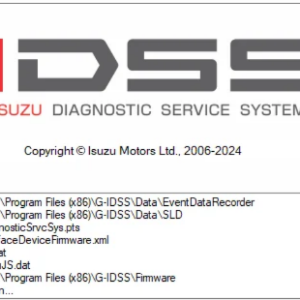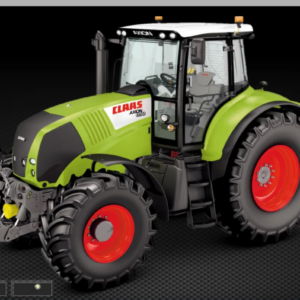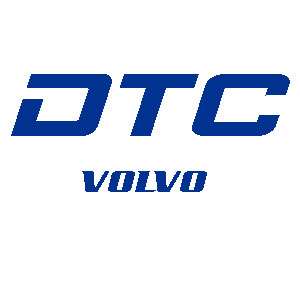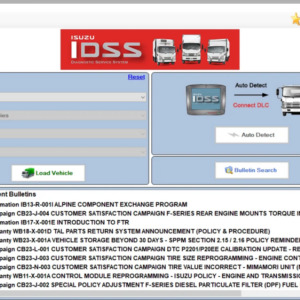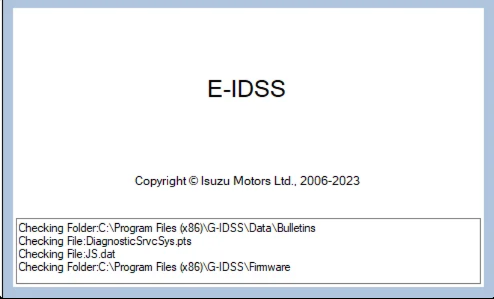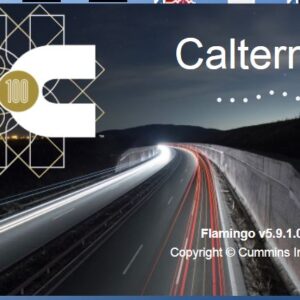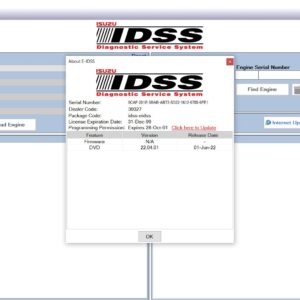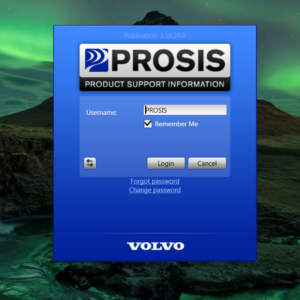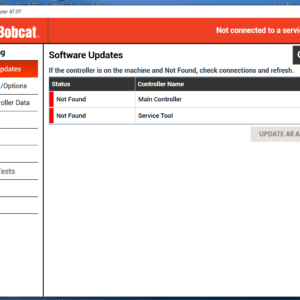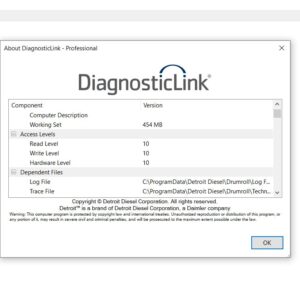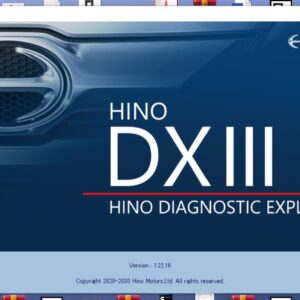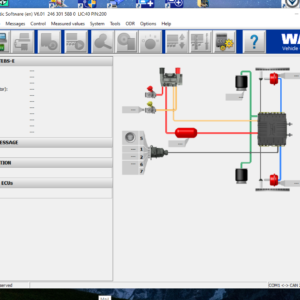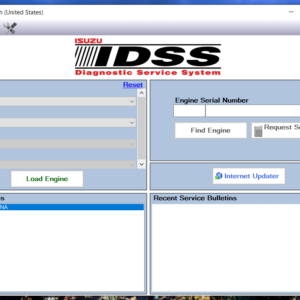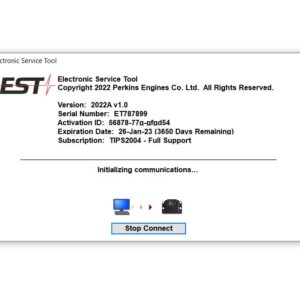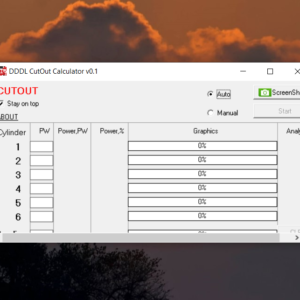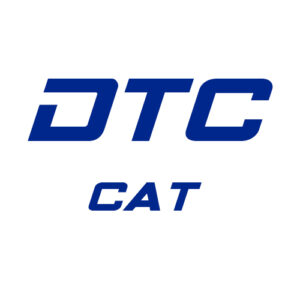The camshaft position (CMP) sensor is an inductive device. As the camshaft turns, the tip of the CMP sensor senses the teeth of the tone wheel fastened to the camshaft vibration damper. The CMP sensor sends a series of voltage pulses to the Engine Control Module (ECM). The frequency of the pulses is translated into engine speed (RPM) and position by the ECM. The ECM uses this information along with the information from Crankshaft Position (CKP) sensor to synchronize fuel injection.
Conditions for diagnostic trouble code (DTC):
1) No camshaft position (CMP) sensor signal
Observable symptoms
1) Difficult to start at next start despite that no diagnostic trouble code (DTC) is set when the engine is running
2) Loss of power
Probable cause
1) Camshaft Position (CMP) Sensor
2) Wiring harness
3) Connector
4) Tooth wheel
5) Engine control module (ECM)
Detailed information
1) The sensor has reversed polarity
2) Incorrectly installed sensor (incorrect distance to tooth wheel)
-
Volvo PROSIS Offline 2019 Parts Catalog Installation Service
Trucks software $45.00Rated 0 out of 5 -
PACCAR Electronic Service Analyst 5.4.3.0 SW files 27.03.2021 software trucks
PACCAR $60.00Rated 0 out of 5 -
Navistar international OnCommand service information 2018 software trucks
Navistar $50.00Rated 0 out of 5
Related products
-
Allison 1000 & 2000 Gen 5 Fault Code:P0977 Shift Solenoid 2 (SS2) Control Circuit – High
1000 & 2000 Gen 5Rated 0 out of 5 -
Allison 1000 & 2000 Gen 5 Fault Code:P2641 Torque Management Feedback Signal – LRTP
1000 & 2000 Gen 5Rated 0 out of 5 -
Allison 1000 & 2000 Gen 5 Fault Code:P2724 Pressure Control Solenoid 1 (PCS1) – Stuck On
1000 & 2000 Gen 5Rated 0 out of 5 -
Allison 1000 & 2000 Gen 5 Fault Code:P0122 Pedal Position Sensor Circuit – Low Voltage
1000 & 2000 Gen 5Rated 0 out of 5 -
Allison 1000 & 2000 Gen 5 Fault Code:P2671 Actuator Supply Voltage 2 (HSD2) – High (Batt)
1000 & 2000 Gen 5Rated 0 out of 5 -
Allison 1000 & 2000 Gen 5 Fault Code:P2789 Clutch Adaptive Learning at Limit
1000 & 2000 Gen 5Rated 0 out of 5 -
Allison 1000 & 2000 Gen 5 Fault Code:P1891 Throttle Position Sensor (TPS) PWM Signal – Low Input
1000 & 2000 Gen 5Rated 0 out of 5 -
Allison 1000 & 2000 Gen 5 Fault Code:P097B Shift Solenoid 2 (SS2) Control Circuit – Open
1000 & 2000 Gen 5Rated 0 out of 5 -
Allison 1000 & 2000 Gen 5 Fault Code:P2723 Pressure Control Solenoid 1 (PCS1) – Stuck Off
1000 & 2000 Gen 5Rated 0 out of 5 -
Allison 1000 & 2000 Gen 5 Fault Code:P2637 Torque Management Feedback Signal – SEM
1000 & 2000 Gen 5Rated 0 out of 5 -
Allison 1000 & 2000 Gen 5 Fault Code:P0973 Shift Solenoid 1 (SS1) Control Circuit – Low
1000 & 2000 Gen 5Rated 0 out of 5 -
Allison 1000 & 2000 Gen 5 Fault Code:P2763 TCC PCS Control Circuit High
1000 & 2000 Gen 5Rated 0 out of 5
-
Detroit DD16 EPA10 (2010-13) Fault Code: SPN 625 FMI 8 (CPC) MCM PT-CAN DM1 Message Not Received or has Stopped Arriving
DD16 EPA10 (2010-13)Rated 0 out of 5 -
Eaton Gen 1 (AutoShift) Fault Code: 43 PID: SID 36 FMI: 5 Range Solenoid Valve
DTC TRUCKSRated 0 out of 5 -
Detroit DD16 GHG14 (2014-16) Fault Code: SPN 1077 FMI 14 (MCM) Internal or External Leakage of the High Pressure Fuel System (Too High, Leak Down Test)
DD16 GHG14 (2014-16)Rated 0 out of 5 -
CAT 3406E (Prefix 5DS or 1LW) Fault Code: 41 PID: 84 SPN: FMI: 0 Vehicle Overspeed Warning
3406E (Prefix 5DS or 1LW)Rated 0 out of 5 -
Volvo All Engines (2013 Emissions) Fault Code: P119E11 PID: EMS Volvo Compression Brake (VCB) Control Highside Circuit
All Engines (2013 Emissions)Rated 0 out of 5 -
Volvo All Engines (2017 Emissions) Fault Code: P009E73 PID: EMS Fuel Pressure Relief Control Performance / Stuck Off
All Engines (2017 Emissions)Rated 0 out of 5 -
Volvo All Engines (2013 Emissions) Fault Code: P100190 PID: EMS Engine Stop Switch
All Engines (2013 Emissions)Rated 0 out of 5 -
PACCAR MX (2004 Emissions) Fault Code: P0266 Cylinder 2 – Torque Contribution Too Low
MX (2004 Emissions)Rated 0 out of 5 -
Volvo All Engines (2017 Emissions) Fault Code: P117800 PID: EMS Starter Motor Deactivated – Cogwheels of Starter Motor and Engine Stuck
All Engines (2017 Emissions)Rated 0 out of 5

